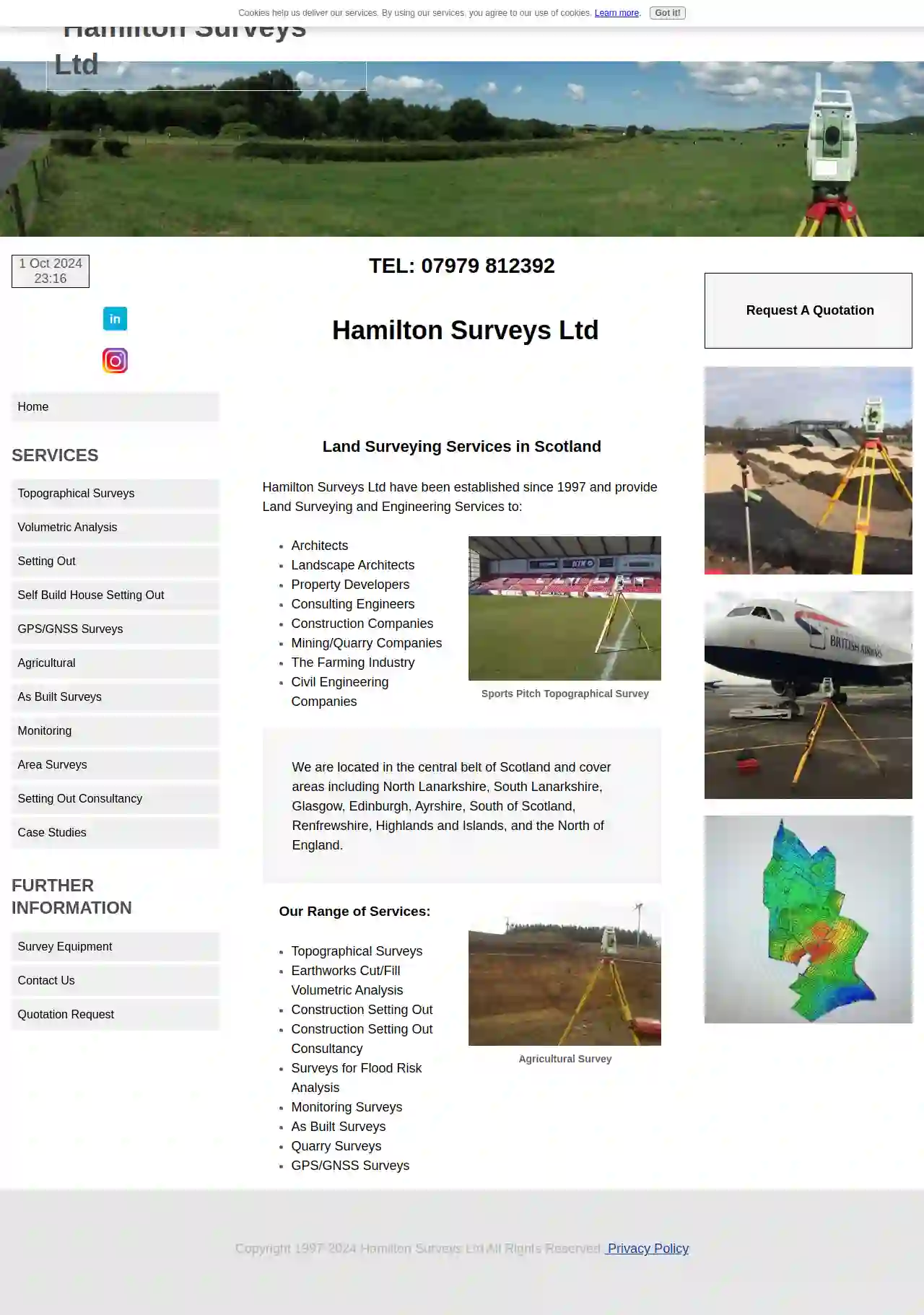Excavation Contractors Larkhall
Find the best Excavating Contractors in Larkhall
Get 3 FREE Excavation Contractors Near Me quotes for your project today! Compare profiles, reviews, accreditations, portfolio, etc... and choose the best offer.

Hamilton Surveys Ltd
4.52 reviewsHamilton, GBHamilton Surveys Ltd Hamilton Surveys Ltd has been established since 1997 and provides Land Surveying and Engineering Services to a wide range of clients, including: Sports Pitch Topographical Survey Architects Landscape Architects Property Developers Consulting Engineers Construction Companies Mining/Quarry Companies The Farming Industry Civil Engineering Companies We are located in the central belt of Scotland and cover areas including North Lanarkshire, South Lanarkshire, Glasgow, Edinburgh, Ayrshire, South of Scotland, Renfrewshire, Highlands and Islands, and the North of England.
- Services
- Why Us?
- Gallery
Get Quote
Centra Tech Drainage LTD
59 reviewsHamilton, GBWelcome to Centra Tech Drainage Ltd Your Trusted Partner in Drainage Solutions We specialize in providing top quality drainage services to residential and commercial customers alike. Whether it’s dealing with clogged drains, slow drainage, or other issues, we’re here to help. Our team of experts is dedicated to providing fast, efficient, and reliable solutions to get your drainage system running smoothly again.
- Services
- Why Us?
- Gallery
Get Quote
MDS Landscape and Design Ltd
83 Gartloch Way, Gartcosh, G69 8FD, GBExperienced garden landscapers in Glasgow When it comes to garden landscaping and design, MDS Landscape and Design Ltd is the company to contact. If you are thinking of having your garden landscaped, get in touch by completing our contact form or giving us a call. Here at MDS Landscape and Design Ltd, we have more than 30 years of combined experience in garden landscaping, working with homeowners and commercial clients alike. Based in Glasgow, we work across a wide area, which includes Lanarkshire, West Lothian, Midlothian, and Renfrewshire. Our company is built on the foundation of customer satisfaction, and we approach each project with the same level of care and attention to detail that we would like for our own garden. Whatever type of hard or soft landscaping project you are considering, get in touch with us for a competitive quotation.
- Services
- Why Us?
- Testimonials
- Gallery
Get Quote
Burgh Resin Specialists
Hamilton, GBScotland's Epoxy Resin Surfacing Experts Burgh Resin Specialists are resin surface professionals providing resin bound driveways, rubber crumb flooring and Savoro flooring across Edinburgh, Glasgow, Falkirk, Fife and The Lothians. Working only with premium quality resins produced from traceable UK materials, we are experts in installing resin surfacing that outperforms any others on the market. We are Burgh Resin, specialist resin surfacing suppliers and installers working across Edinburgh, Glasgow, Falkirk, Fife and The Lothians, providing the strongest driveways, external and internal resin surfacing in the UK.
- Services
- Why Us?
- Gallery
Get Quote- J
J & J Ferguson Ltd
Hamilton, GB- Services
- Why Us?
Get Quote - (R
(Road Surfacing) (tarmac Driveways) Lanarkshire Glasgow. Wjt Trades Ltd
4.73 reviewsHamilton, GB- Services
- Why Us?
Get Quote - Dy
Dyno
Hamilton, GB- Services
- Why Us?
Get Quote - No
Northlanarkshire Garden Care
52 reviewsHamilton, GB- Services
- Why Us?
Get Quote - Wi
William Shanks Construction
Hamilton, GB- Services
- Why Us?
Get Quote - CE
CEMEX Hyndford Quarry
Hamilton, GB- Services
- Why Us?
Get Quote
Over 13,059+ Excavation Contractors onboarded
Our excavation companies operate in Larkhall & surrounding areas!
ExcavationHQ has curated and vetted the Best Excavation Contractors near Larkhall. Find a top & trustworthy pro today.
Frequently Asked Questions About Excavation Contractors
- Trench Collapses: Unstable trench walls can cave in, posing a severe risk to workers. Proper shoring and sloping are crucial safety measures.
- Utility Damage: Striking underground utilities (gas, water, electric) can cause leaks, explosions, or electrocution. Accurate utility locates and careful digging are essential.
- Falling Objects: Materials or equipment falling into excavations can injure workers. Securing work areas and using appropriate safety gear is vital.
- Equipment Accidents: Operating heavy machinery involves risks of rollovers, collisions, or mechanical failures. Trained operators and proper equipment maintenance are critical.
- Environmental Hazards: Excavated soil might contain hazardous materials (asbestos, lead). Proper testing and disposal procedures are necessary.
- Project Size and Scope: The larger and more complex the excavation, the higher the cost.
- Soil Type: Different soil types require different equipment and techniques, impacting costs. Rocky or clay-rich soil can be more expensive to excavate than loose soil.
- Accessibility: Difficult-to-access sites might require specialized equipment or additional labor, increasing expenses.
- Disposal Costs: Hauling away excavated material (soil, rocks, etc.) to disposal sites incurs additional fees.
- Permits and Inspections: Depending on local regulations, permits and inspections might be required, adding to the overall cost.
- Hauling to Designated Disposal Sites: Transporting excavated material to approved landfills or recycling centers.
- Recycling or Reuse: If suitable, some excavated soil might be recycled for other projects or reused on-site for landscaping or backfilling.
- Complying with Regulations: Adhering to local and environmental regulations for soil disposal to prevent contamination or illegal dumping.
- Planning and Surveying: Defining the excavation area, marking utility lines, and determining the required depth and grade.
- Site Preparation: Clearing vegetation, removing obstacles, and ensuring site accessibility.
- Excavation: Using appropriate equipment (excavators, backhoes, etc.) to remove earth and create the desired excavation.
- Hauling and Disposal: Transporting excavated material to designated disposal sites, complying with environmental regulations.
- Backfilling and Compaction: Refilling the excavation with suitable material and compacting it to achieve the required density and stability.
- Grading and Finishing: Leveling and shaping the surface to the final grade for landscaping or construction.
What are the risks associated with excavation?
How much does excavation cost?
How do you handle soil disposal after excavation?
What is the excavation process?
What are the risks associated with excavation?
- Trench Collapses: Unstable trench walls can cave in, posing a severe risk to workers. Proper shoring and sloping are crucial safety measures.
- Utility Damage: Striking underground utilities (gas, water, electric) can cause leaks, explosions, or electrocution. Accurate utility locates and careful digging are essential.
- Falling Objects: Materials or equipment falling into excavations can injure workers. Securing work areas and using appropriate safety gear is vital.
- Equipment Accidents: Operating heavy machinery involves risks of rollovers, collisions, or mechanical failures. Trained operators and proper equipment maintenance are critical.
- Environmental Hazards: Excavated soil might contain hazardous materials (asbestos, lead). Proper testing and disposal procedures are necessary.
How much does excavation cost?
- Project Size and Scope: The larger and more complex the excavation, the higher the cost.
- Soil Type: Different soil types require different equipment and techniques, impacting costs. Rocky or clay-rich soil can be more expensive to excavate than loose soil.
- Accessibility: Difficult-to-access sites might require specialized equipment or additional labor, increasing expenses.
- Disposal Costs: Hauling away excavated material (soil, rocks, etc.) to disposal sites incurs additional fees.
- Permits and Inspections: Depending on local regulations, permits and inspections might be required, adding to the overall cost.
How do you handle soil disposal after excavation?
- Hauling to Designated Disposal Sites: Transporting excavated material to approved landfills or recycling centers.
- Recycling or Reuse: If suitable, some excavated soil might be recycled for other projects or reused on-site for landscaping or backfilling.
- Complying with Regulations: Adhering to local and environmental regulations for soil disposal to prevent contamination or illegal dumping.
What is the excavation process?
- Planning and Surveying: Defining the excavation area, marking utility lines, and determining the required depth and grade.
- Site Preparation: Clearing vegetation, removing obstacles, and ensuring site accessibility.
- Excavation: Using appropriate equipment (excavators, backhoes, etc.) to remove earth and create the desired excavation.
- Hauling and Disposal: Transporting excavated material to designated disposal sites, complying with environmental regulations.
- Backfilling and Compaction: Refilling the excavation with suitable material and compacting it to achieve the required density and stability.
- Grading and Finishing: Leveling and shaping the surface to the final grade for landscaping or construction.